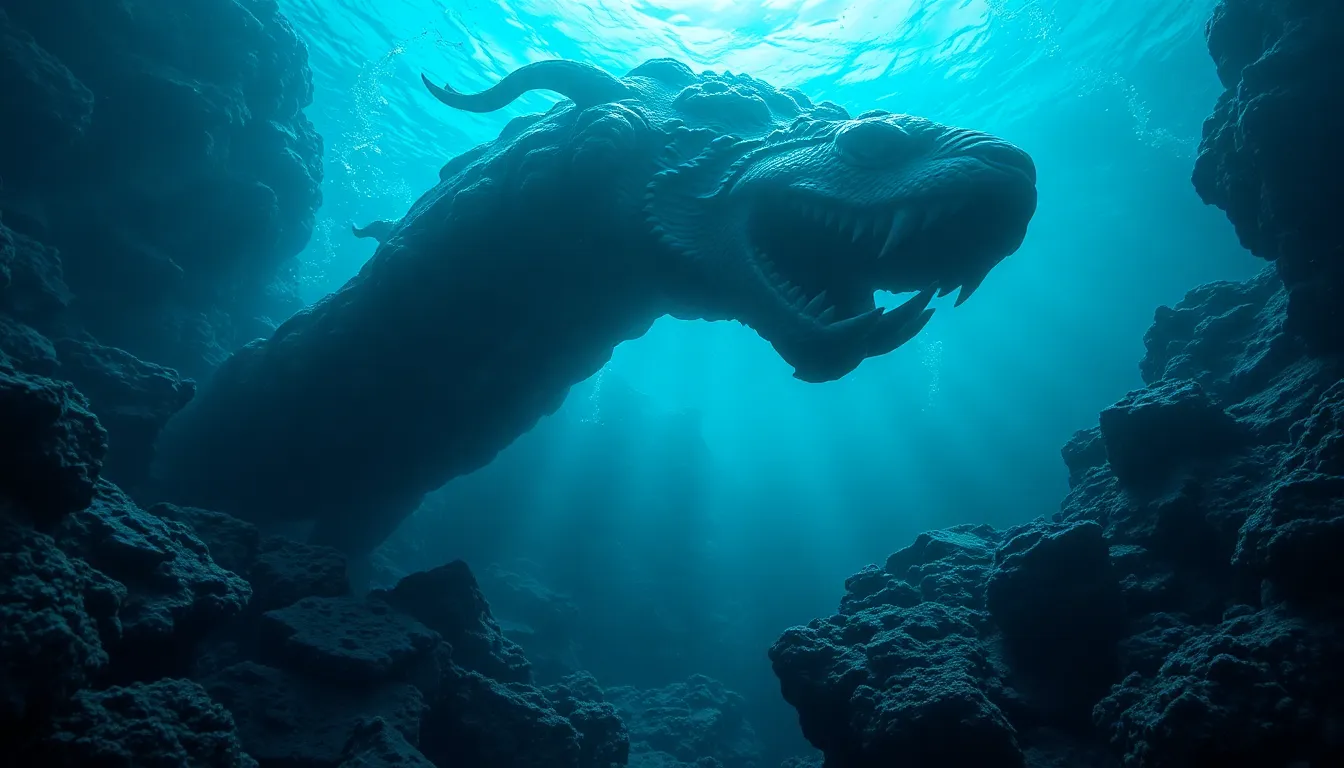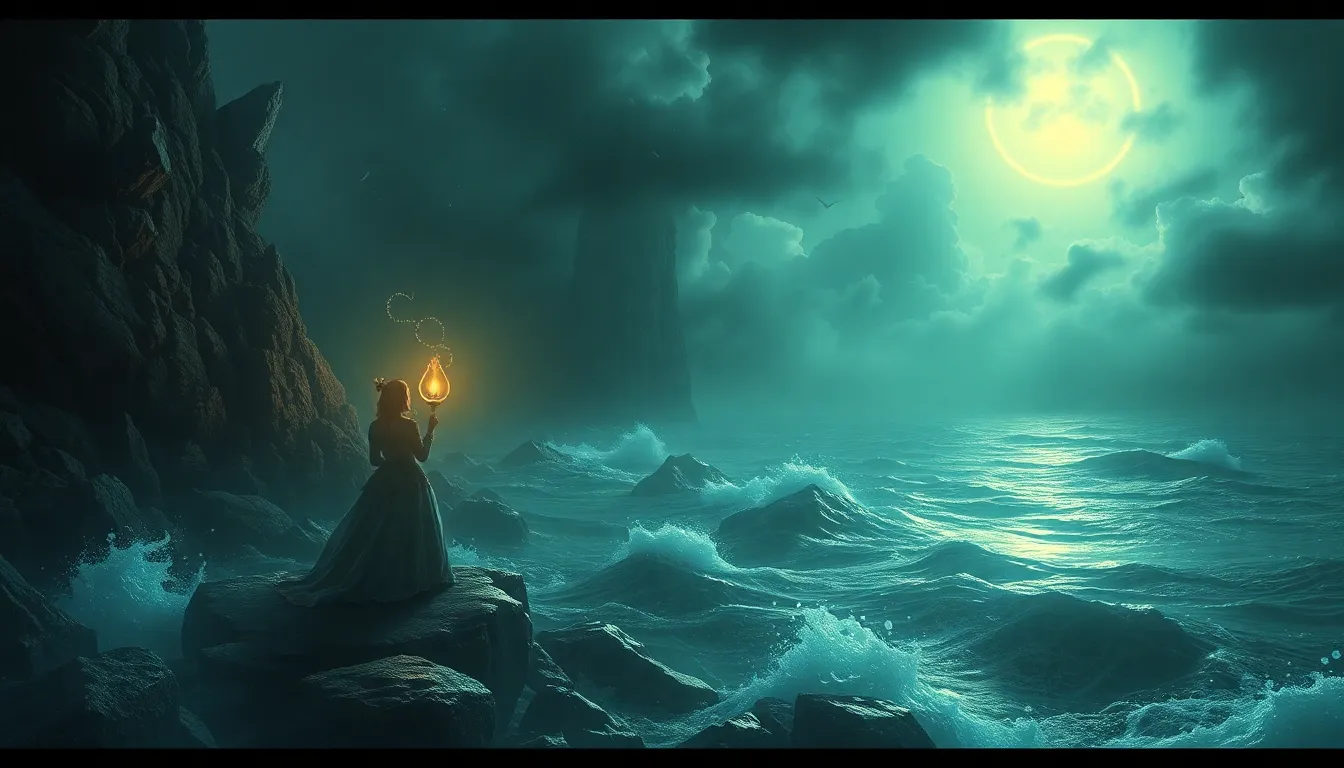The Myth of the Ocean’s Depths: Legendary Underwater Adventures
I. Introduction
The ocean has always captivated humanity with its vastness, mystery, and beauty. From ancient mariners to modern explorers, the deep blue sea is a source of endless fascination and fear. Its depths conceal a world that is as enchanting as it is enigmatic, sparking the imagination of countless cultures throughout history.
Underwater adventures have played a significant role in mythology and culture, giving rise to tales of lost civilizations, mythical creatures, and unsolved mysteries. This article aims to debunk some of the myths while exploring the legendary tales that continue to inspire exploration and curiosity about the ocean’s depths.
II. The Mysterious World Beneath the Waves
As we delve into the depths of the ocean, we encounter a complex ecosystem teeming with life. The ocean is divided into various zones, each with distinct characteristics and species. The sunlight zone, twilight zone, and the abyssal zone are just a few examples of the diverse environments that exist beneath the surface.
Marine life contributes significantly to the legends surrounding the ocean. From the bioluminescent creatures of the deep to the majestic whales that sing their songs, the biodiversity of the ocean fuels the human imagination.
The psychological effect of the ocean on human beings cannot be understated. It evokes feelings of awe and curiosity, often leading to a desire to explore its depths. This allure is deeply ingrained in our collective consciousness, inspiring tales of adventure, danger, and discovery.
III. Famous Underwater Legends and Myths
Throughout history, various legends have emerged that reflect humanity’s fascination with the ocean.
A. The legend of Atlantis: fact or fiction?
One of the most famous myths is that of Atlantis, a highly advanced civilization said to have sunk into the ocean. First mentioned by the philosopher Plato, Atlantis has been the subject of speculation for centuries. While many believe it to be a myth, some argue that it may have been based on real historical events.
B. Mermaids and mermen: their origins and cultural significance
Mermaids and mermen have been part of folklore in many cultures, often depicted as beautiful beings who lure sailors to their doom. These creatures symbolize the ocean’s duality, representing both allure and danger. Their origins can be traced back to ancient myths, where they were seen as protectors of the sea.
C. The Kraken: exploring the tales of giant sea monsters
The Kraken is another legendary creature, believed to be a giant octopus or squid that terrorizes sailors. Stories of the Kraken have emerged from various cultures, often used to explain unexplained disappearances at sea. As we learn more about the ocean’s inhabitants, some scientists speculate that these tales may have been inspired by real encounters with giant sea creatures.
IV. Historical Accounts of Underwater Exploration
Humanity’s relationship with the ocean has evolved over millennia, leading to significant advancements in underwater exploration.
A. Ancient civilizations and their ventures into the depths
From the Phoenicians to the Polynesians, ancient civilizations navigated the oceans, often venturing into deep waters in search of trade routes and new lands. Their voyages laid the groundwork for future exploration.
B. The evolution of underwater exploration technology
Over the centuries, technology has advanced dramatically. The invention of the diving bell in the 16th century marked the beginning of serious underwater exploration. Today, sophisticated submersibles and remotely operated vehicles (ROVs) allow scientists to explore the ocean’s depths like never before.
C. Notable expeditions that shaped our understanding of the ocean
Several notable expeditions have contributed to our knowledge of the ocean, including:
- The HMS Challenger expedition (1872-1876) – the first scientific study of the deep-sea environment.
- The Cousteau Society’s explorations in the mid-20th century, which brought underwater exploration to the public’s attention.
- The recent discoveries made by the Ocean Exploration Trust, which uses advanced technology to explore uncharted waters.
V. The Role of Folklore in Underwater Adventure
Folklore plays a crucial role in shaping our perception of the ocean and its mysteries.
A. How folklore influences perception of the ocean
Folklore often reflects humanity’s fears and aspirations regarding the unknown. Stories of sea monsters and shipwrecks serve as cautionary tales, while legends of sunken treasures inspire adventurers.
B. The impact of storytelling on exploration and discovery
Storytelling has historically motivated explorers to seek out the unknown. The promise of discovering lost cities or hidden treasures spurred many voyages and discoveries.
C. Case studies of specific folklore stories and their origins
Many folklore tales have historical roots. For example, the story of the Flying Dutchman, a ghost ship doomed to sail the seas eternally, may have originated from real shipwrecks and the sailors’ fears of the supernatural.
VI. Modern-Day Underwater Adventures
Today, underwater exploration has evolved into a popular activity for many.
A. Scuba diving and its rise in popularity
Scuba diving has become an accessible way for individuals to experience the underwater world. With the rise of dive schools and resorts, more people are discovering the beauty of coral reefs and marine life.
B. Underwater archaeology: uncovering lost civilizations
Underwater archaeology has opened a new frontier in understanding human history. Shipwrecks and submerged cities are being uncovered, revealing artifacts that tell stories of past civilizations.
C. Technological advancements in deep-sea exploration
Innovations such as autonomous underwater vehicles (AUVs) and advanced sonar technology have revolutionized deep-sea exploration, allowing scientists to map the ocean floor and study marine ecosystems in unprecedented detail.
VII. The Environmental Impact of Underwater Adventures
While underwater adventures can be exciting, they also come with responsibilities.
A. Balancing adventure and conservation
As interest in underwater exploration grows, so does the need for conservation. It is crucial to balance adventure with the preservation of marine ecosystems.
B. The effect of tourism on marine ecosystems
Marine tourism can have both positive and negative effects. While it can promote conservation awareness, it can also lead to habitat destruction and pollution if not managed properly.
C. Sustainable practices for future underwater explorations
To ensure the health of our oceans, sustainable practices must be implemented, including:
- Using eco-friendly diving gear.
- Following strict guidelines for marine tourism.
- Participating in conservation efforts and clean-up activities.
VIII. The Psychological Thrill of Underwater Exploration
Underwater exploration offers a unique psychological experience.
A. The allure of the unknown and human curiosity
The ocean represents the ultimate frontier for human curiosity. The desire to explore the unknown drives many to take the plunge into the depths.
B. The fear factor: confronting deep-sea dangers
While the ocean is beautiful, it can also be dangerous. The fear of the unknown can be a powerful motivator, pushing individuals to confront their fears and grow.
C. The personal growth and transformation through underwater adventures
Many divers report transformative experiences while underwater. The sense of weightlessness and connection with nature can lead to profound personal insights and a greater appreciation for the marine environment.
IX. The Future of Ocean Exploration
The future of ocean exploration is bright, with exciting developments on the horizon.
A. Innovative technologies on the horizon
Emerging technologies such as AI and machine learning are set to revolutionize ocean research. These tools can help analyze vast amounts of data, leading to new discoveries about marine life and ecosystems.
B. The importance of global cooperation in ocean research
Collaborative efforts among countries and organizations are essential for comprehensive ocean research. Global cooperation can facilitate the sharing of knowledge and resources, leading to a better understanding of ocean health.
C. Potential discoveries that could reshape our understanding of the ocean
As we venture deeper into the ocean, the potential for groundbreaking discoveries increases. From new species to ancient shipwrecks, each exploration holds the promise of reshaping our understanding of marine science.</




